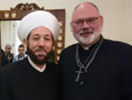 The Reverend Andrew Ashdown has been visiting Syria since 2005 – several visits before the conflict, and three in the last two years. On this occasion he was a member of a diverse peace delegation which was allowed freedom of movement by the Syrian Government. Ashdown writes: During the visit we met with hundreds of people - local and national political leaders, both government and internal opposition figures; with local and national Muslim and Christian leaders and members of reconciliation committees; with internally displaced refugees; and with numerous people on the streets of towns and cities – Sunni, Shi’a, Christian, Alawite; most of whom feel their voices are unheard, ignored and misrepresented.
The Reverend Andrew Ashdown has been visiting Syria since 2005 – several visits before the conflict, and three in the last two years. On this occasion he was a member of a diverse peace delegation which was allowed freedom of movement by the Syrian Government. Ashdown writes: During the visit we met with hundreds of people - local and national political leaders, both government and internal opposition figures; with local and national Muslim and Christian leaders and members of reconciliation committees; with internally displaced refugees; and with numerous people on the streets of towns and cities – Sunni, Shi’a, Christian, Alawite; most of whom feel their voices are unheard, ignored and misrepresented.
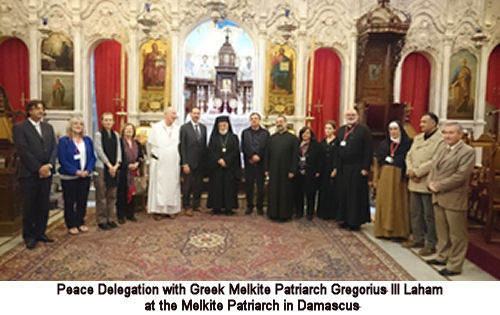 Candobetter.net Editor: Emphasis and headings that are not place-names have been inserted by the editor.
Candobetter.net Editor: Emphasis and headings that are not place-names have been inserted by the editor.
Revd Andrew Ashdown is an Anglican Priest in the Diocese of Winchester, England. He has been visiting, leading groups to the Middle East, and engaging with faith leaders in the region for 30 years. He also works in the field of Inter-faith. Andrew visited Syria several times prior to the conflict, and has visited the country three times in the last 20 months. He is currently undertaking a PhD exploring Christian/Muslim relations in Syria in recent years. - Editor.
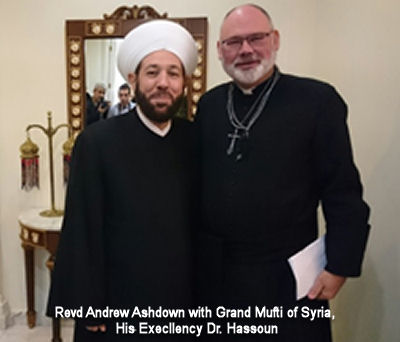
Delegation to Syria
I was in Syria as part of an international delegation in Syria, led by Mairead Maguire, Nobel Peace laureate; at the invitation of the Greek Melkite Syrian Patriarch Gregorius Laham; and at our own expense. This was my third visit to Syria since April 2014, and I have visited Syria on several occasions prior to the conflict.
Voices of Syrians themselves are largely ignored in polarised narrative
In this report, I seek to convey the key messages from my latest visit to Syria. The context is highly complex. The country has long been a rich mosaic of cultures and faiths. It is a birthplace of civilisations and of the Abrahamic faiths, which have lived predominantly in harmony for hundreds of years. In the context of the war, there are many narratives, and the West’s tends to be skewed, biased and misleading. Of course there are truths in all narratives, but those that pretend that Syria’s problems are ‘black and white’ or a case of ‘good vs evil’ are profoundly misguided. In all of it, the voices of Syrians have been largely ignored. And as I have travelled in the country in the past couple of years, I have found a remarkable consistency to the cries and wishes of the people – cries and wishes that fly in the face of the violent prejudices and narratives of those outside the country.
Government provided delegation with armed guard but did not prevent our freedom of movement
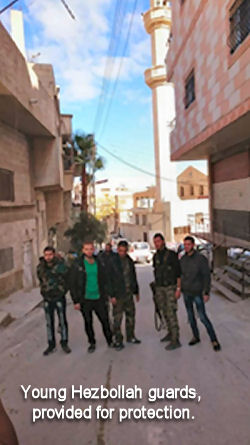
For the visit, the Church arranged with the Government to provide us with armed security for protection for which we are very grateful, as the risk of attack or kidnap anywhere is real, but we had no government representative with us, and were free to move as we wish.
During the visit we met with hundreds of people - local and national political leaders, both government and internal opposition figures; with local and national Muslim and Christian leaders and members of reconciliation committees; with internally displaced refugees; and with numerous people on the streets of towns and cities – Sunni, Shi’a, Christian, Alawite; all of whom feel their voices are unheard, ignored and misrepresented.
Itinerary
We travelled to Damascus, Homs, Maaloula and Tartous, and stayed 3 nights in a 6th Century monastery just 8 km from ‘IS’ lines. Sadly we had to flee Maaloula when we were informed that terrorists in the surrounding area (belonging to a western-backed ‘moderate’ faction) had heard of our visit and intended to try to ambush us.
We had hoped to visit Aleppo, but our safety both on the route and in the city could not be guaranteed. In Lebanon we also met with General Michel Aoun, a leading Christian politician, and with the Vice-president of Hezbollah, Sheikh Naim Qassem.
Damascus
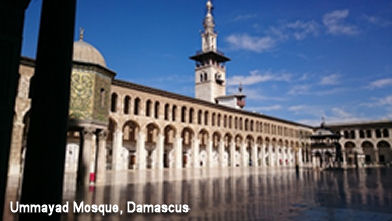
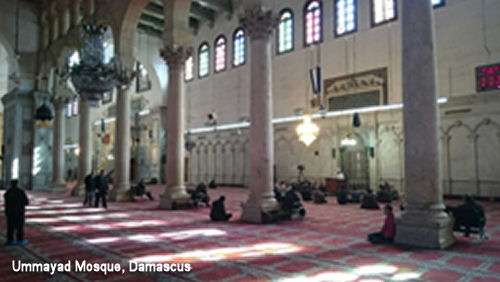
The centre of Damascus – the historic and commercial areas of the city – remains beautiful, despite the ravages of frequent shelling from ‘rebel’ held suburbs. But the presence of numerous army checkpoints throughout the city, and the economic effects of the war – closed hotels and shops – are evident. Yet life goes on. People try to live with a degree of ‘normality’, but the economic situation is increasingly harsh.
Talking to friends and people on the street in Damascus and elsewhere is deeply moving. The economic crisis is biting deep. Vast numbers of people have no or little income and are struggling to survive. One friend told me he knew several friends who had had good jobs before the conflict, who are now reduced to begging on the streets. In some areas of Damascus, formerly a proud, dynamic, prosperous city, there are lines of impromptu stalls selling second hand clothes - not from charities as in Africa - but from ordinary citizens selling clothes and belongings in order to eat, or heat their houses in the winter. Again and again, we have been told this is the primary reason now for many emigrating - not (as Western politicians or media would have us believe) for fear of the government; but simply the need to survive. One person said: "We can survive the war, but we cannot survive without food". This is a heart-rending situation especially for those of us who knew Syria before the conflict. Certainly, I detect a change even since my last visit in April this year - a shift from fear (there is a sense that Russia has helped shift the balance in the war) - to a sense of real sadness and depression. Everyone is affected and exhausted by the war and longs for its end. The actions of the western allies are only prolonging it and deepening the suffering.
It was a joy to spend a few hours with Greek Melkite Patriarch of Syria, His Excellency Gregorius III Laham, and to be invited to lunch with him. It is often forgotten that Christianity in Syria dates from the time of St. Paul, and there have been Christians in the land ever since. Syria remains the only country in the world where Aramaic, the language of Jesus, is still spoken.
The Patriarch’s message? : Syria is the cradle of civilisation and of faiths which have for centuries lived in harmony together. The world should cease arming and supporting people of violence, and bring all parties together in a shared political process. Outsiders have no right to dictate who is or isn't a part of that process. Who leads the country should be chosen by Syrians, not by external powers. For the sake of Christianity, and for Christian-Muslim relations worldwide, the Church should be listening to the people of faith from the lands of their birth. Sadly, that call is ignored.
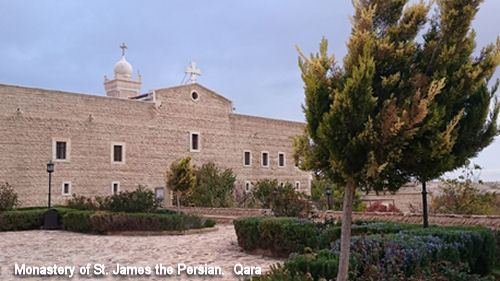
In Damascus we also met with the Grand Mufti, His Excellency Dr. Ahmad Badr Al Din Hassoun. An impressive figure and a highly respected Muslim theologian in his own right, Dr. Hassoun is passionate about the plurality of Syrian society and the equal place that Muslims, Christians and Jews have always had, and should continue to have, within it. Dr. Hassoun must be one of the most ‘moderate’ and inclusive Muslim leaders in the world , and yet countries in the west, because he is a President’s appointee, refuse to meet him. There are indeed those of an Islamist persuasion in Syria who hate him because he represents an approach to Islam that some Islamist interpretations do not allow. Yet, he represents hope for the continuance of inter-religious respect and sectarian stability in Syrian society, and is certainly someone with whom our leaders should be speaking, but he is refused a visa to visit Britain.
Qara
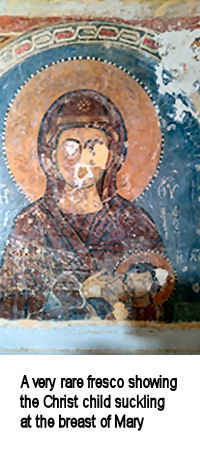
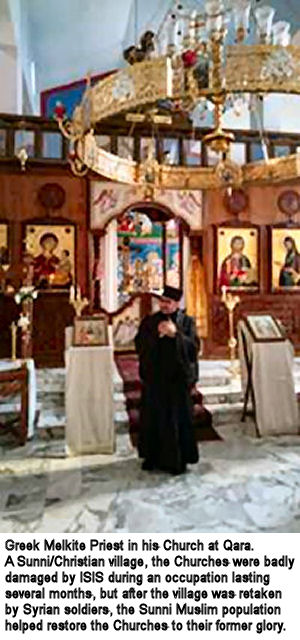

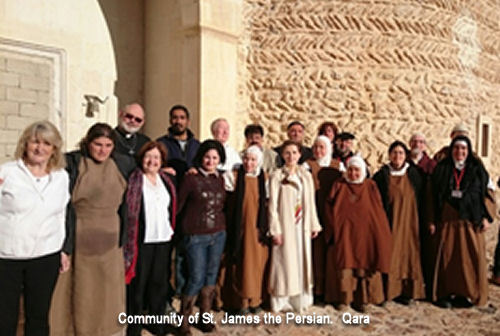
Our Base for three nights was the remarkable Monastery of St. James the Mutilated, near the Sunni/Christian village of Qara, in the desert 60 miles north of Damascus. Here, we were surrounded by fighters of the so-called 'IS' about 25km to the east, and about 8 km to the west. The village was occupied by them briefly in November 2013, and the monastery was untouched due to the protection of the Muslim residents of the village who smuggled food to them.
The monastery was built in the 6th Century. Its Church was built on both a previous Roman one and a pagan temple before that, a symbol of the ancient rootedness of Christianity in the land of Syria. Its ruins were restored by the amazing indomitable Mother Agnes, who has worked untiringly with local Christian and Muslim leaders to undertake reconciliation processes in village communities; to rehabilitate fighters and negotiate truces. There is an inspiring community of nuns and monks here living out a Christian ministry and witness. Mother Agnes is much loved and respected here and the criticism she has received in the west I believe is grossly unfair. Nights were punctured with the regular sound of not so distant gunfire and shelling. And yet despite the proximity of terrorists, each service is preceded with the ringing of a loud bell that echoes across the valley. A profound symbol of witness, courage and presence.
Qara village is a majority Sunni village with a minority Christian population. The two communities have lived together with mutual respect for centuries. The Mosque is actually an ancient Christian Church, and the Churches in the town were badly vandalised by Daesh when they occupied the town in 2013, including ancient and rare frescos . Muslims and Christians protected each other during the occupation and both communities have helped to restore the local Churches. The mayor and faith leaders spoke with pride of the harmony in the town, but fear of what may be if the 'rebels' are allowed to win.
Homs
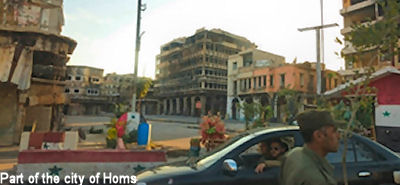
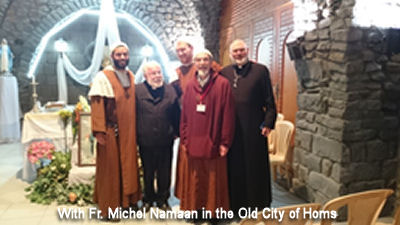
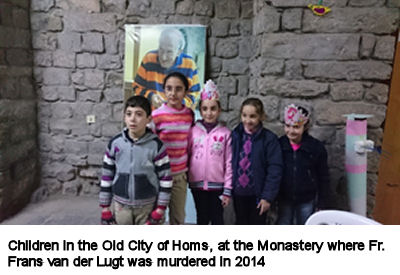
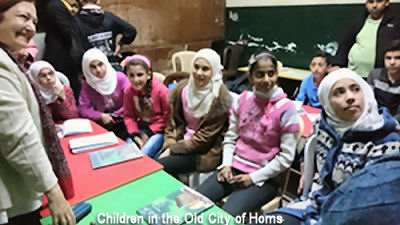
Homs is a poignant city. Half of it (that half that was occupied by the extremists) is completely destroyed, whilst the government-controlled side has a degree of normality. In 2014, I had visited the city when shelling and car-bombs from rebel positions in the city were a daily reoccurrence. In the town we spoke to citizens, who are delighted that the city has been liberated from the 'rebels'. A young Christian woman showed me a photograph of her bombed out home. I asked her who had bombed her home. She said that the Government had bombed her home after her family had fled the rebel occupation. Her words?
“If it takes the Government to bomb my house to get rid of the terrorists, I accept that.”
Meeting with the Governor of Homs Province, he told us that plans for the rebuilding of Homs have already been drawn up by wealthy Syrians in the Gulf. Over 1000 citizens who had fled have returned to the city and more are returning each month.
Christian and Muslim leaders in Homs worked together for liberation truce
Local Christian and Muslim leaders in the city had been instrumental in agreeing the reconciliation truce that led to the liberation of the city.
The government had declared an amnesty for fighters who chose to lay down their arms, and several hundred have been reintegrated into the community. Those who didn't were allowed to leave with one weapon – many of these are now fighting in Idlib province.
People in Homs asked why western government support terrorists
There are still tensions however and not everyone supports the government. Indeed, some armed fighters remain in one part of the city. But the city feels like one that is on a path towards healing. One evening, we went walking in the streets of the city. People were coming up spontaneously and welcoming us to Homs. They were all saying how glad they are that the city has been liberated, and asking why western governments are supporting ‘terrorists’ (the rebels). One young man came up to us and said he had been a tourist guide prior to the conflict and was moved to tears to see us as foreigners visiting the city. They urged us to tell our governments to work with the people of Syria to bring peace.
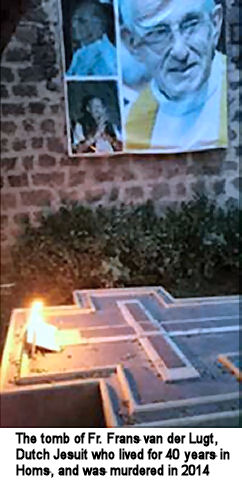
Fr Franz Van den Lugt said that foreign militants started the violence in the Homs uprising
It was deeply moving to visit the Jesuit Centre in Homs where Fr Franz Van den Lugt, a much loved Dutch priest who worked in Homs for 40 years, was shot through the head last year whilst sitting in the garden. The chair on which he was assassinated is still in place. He had declared that the violence in the uprising in Homs had been started by foreign militants, (he was there) but had refused to leave the monastery when militants took over the area. His school is still running and the children, in the heart of this devastated part of the city, are a sign of hope.
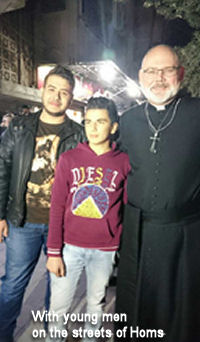

One evening was spent in the heart of the Old City of Homs to meet some of the most remarkable people of faith in the world - the Ministry for Reconciliation led by Fr Michel Naaman and the local Sheikh in the city. Throughout the occupation of the city by militants, the faith leaders have worked tirelessly to bring peace and reconciliation between communities, and their work has had some amazing success. They oversaw the evacuation of the rebels from the city, during which the priest told us, the Syrian army were distributing food and cigarettes to the rebels. Those rebels who laid down their arms have been reintegrated into the city. During their work, several of the Reconciliation Committee have been injured or killed by people they were trying to help. Their work continues to bring together the different factions in Homs, and they believe that only peace and love will transform situations of conflict.
Shock at Archbishop of Canterbury support for British bombing campaign
I told Fr Michel that the Archbishop of Canterbury had that day lent his support to the British Government’s desire to bomb 'IS'. Everyone in the room - Christian and Muslim -were visibly shocked. I asked what his message was....it is this:
"Syria was always a diverse people in unity with each other. People should unite to defeat terrorism, but should respect national sovereignty. The West says they want to destroy Daesh but Syrian people will be killed and towns will be destroyed... They really want to defeat Syria. It is likely there will be terrible consequences. Have the West not learnt from the past? Instead, stop fuelling 'IS' with weapons and support to people of violence, and help all Syrians to come together to find a political solution and have a national dialogue. Give the money that will be spent on destruction to Syria to help in reconstruction. And If not, leave us alone and let Syrians choose their own future... "
Internal opposition
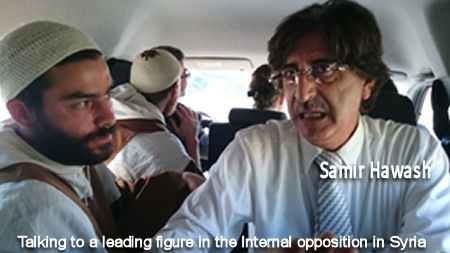
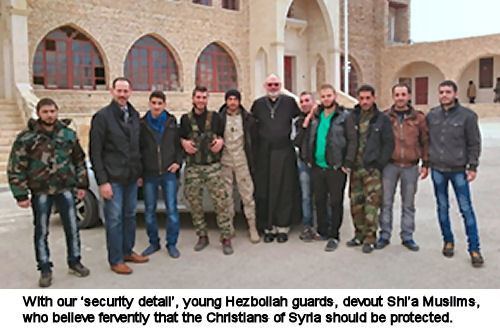
In my three visits to Syria since April 2014, I have met most of the internal opposition figures in the country. There are some good people amongst them. Along with many eyewitnesses during the initial demonstrations in 2011, some of them have spoken of the presence of non-Syrian armed militants who helped stoke the flames of violence during those early months. The Opposition leaders speak openly and very critically of the political shortcomings of the regime, especially the issues of political imprisonment, disappearance, and corruption. But they maintain that Assad himself is the only leader capable of holding the sectarian balance. They admit that there are both good and bad people in the government, and that Assad has been held back in his desire for reform from members of the ‘old guard’.
Western ‘peace’ processes bar Syrian internal opposition politicians
We spent a remarkable three hour journey in the company of one of Syria's leading internal opposition leaders, Samir Hawash, an impressive man who has joined recent discussions in Moscow, Kazakhstan and Istanbul, but like all internal Syrian politicians, is refused inclusion in the western 'peace processes'. He was involved in early demonstrations, but early on was informed that militant groups were planning an armed uprising with assistance from outside. He begged the leaders of the militants not to take up weapons.
In 2010 he had been informed “there is going to be a war in Syria. It has all been planned.” He told us that when the demonstrations began, most people had wanted change, but he says now maybe 60-70% of Syrians in the country support Assad as the only person who can hold the country together. He has become a symbol of unity.
This has been the consistent impression from everyone whom we’ve met – Sunni, Shia, Alwaite, Christian.
Samir Hawash says armed militants fired first in demonstration
We asked him if the government had fired first on the demonstrators. He said that he was there. And no, it was armed militants who fired first.
Over 80 soldiers were killed in the early days of the ‘peaceful’ demonstrations – and the names and dates are documented. (I’ve heard the same from people who participated in the demonstrations in Homs, Latakkia, Damascus, and Aleppo.)
He said all militant opposition groups want to see a Muslim State and the division of the country (a position that all the Parliamentary and political meetings I have attended in Britain seem to approve); whilst the unarmed parties who seek a secular, pluralistic State are not given credence or a voice in the international arena.
He said that Turkey will support any opposition as long as regime change is the goal. The only goal on the part of the international community from the very beginning has been regime change, and they have been willing to allow the destruction of a country to achieve it.
Tartous
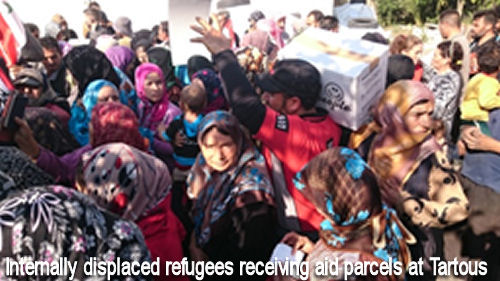
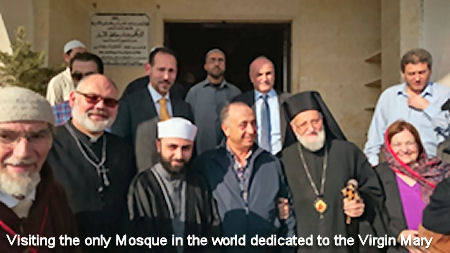
Our visit to Tartous was to receive a mobile medical centre that has been donated by a Dutch company for use amongst internally-displaced refugees in the coastal area, and also as a distribution centre for aid to refugees. It was deeply moving to meet those who had come to receive aid.
Some of the women told us (the monks who were with us translated for us) how their husbands and sons had been murdered by rebel groups (that the West is supporting and regards as 'moderate'). Notice the picture of Assad and Putin on the side of the distribution centre...everywhere we went, the Russians are regarded as heroes!
It is very hard to describe however the emotion of what we stumbled across by chance when we visited a local hospital. We could not have known that our visit would coincide with the return of the bodies of 22 soldiers killed in a battle in Aleppo, to their families.
Hundreds had gathered, and there was intense emotion as the coffins were loaded off a lorry, to the piercing cries of grieving relatives. We joined the crowds giving condolences to families who seemed to genuinely appreciate our presence.
Suddenly a young boy of about 10 whose fathers body was being returned, and was standing next to his crying mother and a sheikh, stood to attention in front of me, saluted and with tears flowing gave a deeply moving speech.
One of the monks with me told me that in what he said there was not one word of anger, hatred or violence, but that his words were roughly this:
"My father is a blessing to this country. He has given his life so that we may live in peace. But he is not dead. He is a martyr. And I honour him. He will live, and because of him syria will have peace."
I stood to attention looking straight at him with the crowds around looking on and letting him finish. I then saluted him before going to hold him and give e him a blessing. I could not stop the tears. The sheikh hugged me with tears in his eyes too. It is an experience I will remember as long as I Live… It was far too intense a moment to photograph.
The crowds dispersed with sirens and loud gunfire...
Maaloula

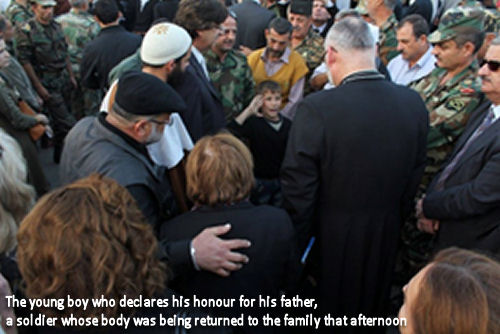
We had a fairly dramatic visit to Maaloula, the most famous Christian village in Syria, where the residents say they have lived for 5000 years, and where Aramaic, the language of Jesus is still spoken.
We were due to spend half the day there with the people of the town, but shortly after our arrival the Mayor received a message that terrorists in the surrounding hills had heard about our visit, and were going to attempt to ambush us. So with huge disappointment we had to make a high speed departure to Damascus.
I was therefore very pleased that I had visited Maaloula in April 2015, and visited both the ancient shrines of St. Thecla and of St. Sergius, both of which have been very badly damaged and defaced by the rebels. Most of the precious icons for which Maaloula is famous have also disappeared. The town was occupied by the rebels for three months, during which time there was huge tension between the Muslim and Christian residents of the town, though some of the Muslim residents had sheltered Christians. A number of Christian villagers were murdered by the rebels for refusing to convert to Islam. There is a concerted effort, with Government help, to restore the shrines and rebuild the town, and some of the residents who fled have returned.
Lebanon: Meeting with Sheikh Naim Qassem, Vice-President of Hezbollah.
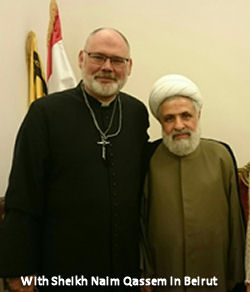
Essential to finding paths to peace is talking to all parties. So it was interesting to meet with Hezbollah MPs and Sheikh Naim Qassem, Vice-president and a founder of Hezbollah in Lebanon. Hezbollah are a deeply religious Shia group, and one which respects other faiths. (One of the monks in Syria told me he had learned more about the Virgin Mary from a Hezbollah young man, than anyone else!) And my encounters with Hezbollah individuals have been of a primarily dignified and respectful people. I certainly did not agree with everything Sheikh Qassem said, but there was wisdom and truth in much of what he said.

I asked him what he would say to the British Government if they were ever to listen to him. His reply was:
"The issue for the British Government is discernment between Truth and falseness. Who are they really against and what do they really stand for? We don't want you to be our supporters.. We want you to support truth..and you cannot be selective about international law."
(See picture in this article of the author with Sheikh Qassem, another Hezbollah MP (also a local doctor), the Greek Orthodox Bishop of Bekaa.
Lebanon. Bourj Al Burajneh
In Beirut we visited the site of the bombing in Burj Al Burajneh that killed over 40 people and injured over 100 the day before the Paris bombing. We laid flowers and placed candles there.
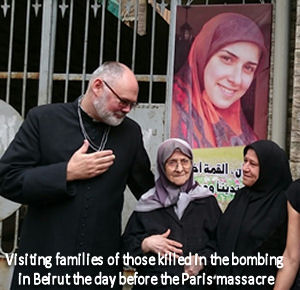
One young man had prevented further killings by tackling a suicide bomber and covering him with his own body before the vest exploded.
Our visit, in the heart of a Hezbollah district, was clearly appreciated by everyone around. We were then taken to the local hospital to meet some of the wounded. The little lad, aged about 10, pictured in hospital with his mother, was riding past on his father's motorbike. His father was killed. The doctor said he was very close to his father and is deeply psychologically scarred.
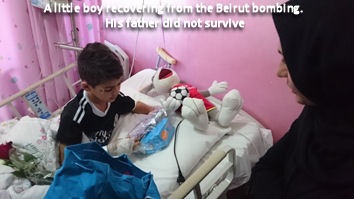
The families and victims (Shia Muslim) wanted to receive our prayers and blessings, and one little boy even asked for my cross. I told them at the location: every soul killed and family bereaved in Beirut is equally as important as each soul and bereaved family in Paris, Syria or Russia.
General Michel Aoun
We spent nearly two hours with General Michel Aoun, Chairman of one of Lebanon’s most important Christian parties. He spoke of the recent history of Christianity in the Levant, and suggested to us that with the Christian populations in Iraq and Palestine so severely depleted, Lebanon and Syria are now the most important Christian centres in the Levant. He said we have a responsibility in the West to protect the Christians of the east – in the birthplace of Christianity. He spoke of the danger to Christians in the region now, and that their presence as part of the fabric of society in the region is essential to the stability and p lurality of the fabric of the region as a whole.
Key points from the visit:
Despite enormous suffering and a devastating economic situation, there is enormous resilience. Those who live in or have fled to the comparative safety of the government-controlled areas (perhaps 60% of the population), whether Christian, Sunni, Shi’a, Alawite, Druze, and of different political persuasions, where life goes on with a degree of ‘normality’ amidst great hardship, and there is some small degree of rebuilding and State infrastructure, (the destruction is not total) have a remarkably consistent message:
• Stop supporting armed groups. There are very few so-called ‘moderate’ rebels and those that do exist are divided – they have become channels for weapons to the extremists who are by far the majority and whose sole goal is an Islamic State.
• Work together to defeat Daesh. Bombing is not the answer… civilians will be killed and towns and villages will be destroyed. The consequences of simply bombing Daesh could be disastrous in the long term… the creation of more jihadis and hatred. Cut them off at source – their funding and arms, and support those who fight them on the ground.
• Bring all parties together in a national dialogue. You cannot exclude the government that is managing the State institutions and structures.
People are very suspicious (and probably justifiably) of the motives the Western alliance. They believe they are political pawns in a much bigger political ‘game’.
• You cannot exclude the people of Syria from a political solution.
• Realities in Syria are profoundly misrepresented in the west.
• There are multiple narratives. It is not ‘black’ and ‘white’ (or ‘good’ vs ‘evil’) as appears to be the primary presentation in the media.
• An externally imposed solution is only like to lead to further sectarianism and chaos
• Follow international law in your dealings with Syria.
Listen to the faith communities. Much can be learned and foundations have been laid from the work of the reconciliation committees ‘on the ground’ in towns and cities across the country.
Come and visit Syria. Meet and listen to the people for yourselves.
We were met with enormous kindness and hospitality. The people are exhausted and emotionally traumatised. Christians and Muslims continue to work together to bring peace and reconciliation in local towns and cities with some remarkable successes. Those involved are absolutely opposed to violence. Everyone wants to see the war end.
Our government’s position and ignorance of the realities on the ground and the wishes of the people of Syria is profoundly disturbing.
Revd Andrew Ashdown
3 December 2015

Add comment